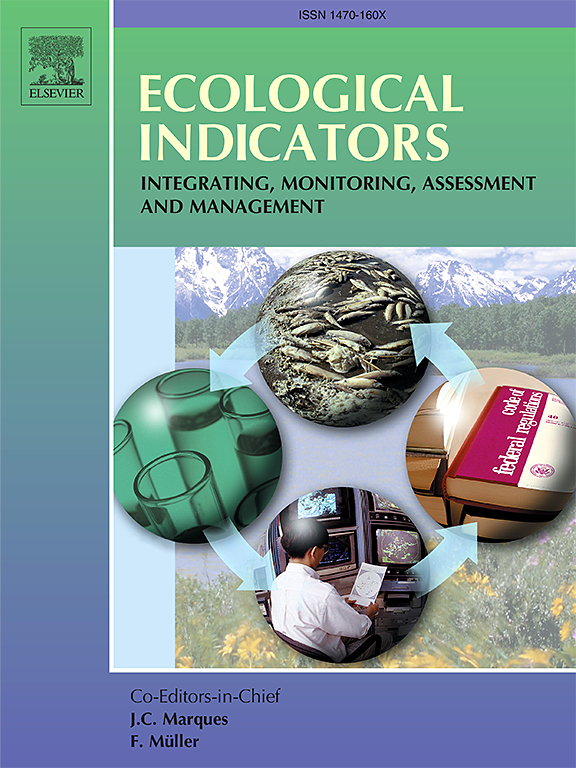基于可持续发展目标的黄河流域水系可持续性重构与综合评价
IF 7
2区 环境科学与生态学
Q1 ENVIRONMENTAL SCIENCES
引用次数: 0
摘要
有效的水系管理对于实现大流域的可持续发展至关重要,但水资源、环境、生态和人类活动之间的相互作用尚未得到充分探讨。以黄河流域为研究对象,研究了2015 - 2022年水资源-环境-生态-行动系统耦合协调与环境公平的时空演化特征。通过耦合协调分析和基尼指数分析,结果显示环境公平程度逐步提高,基尼指数从0.257下降到0.229,表明水资源分配更加公平。尽管取得了这些进展,但耦合协调程度仍处于“边缘失序”阶段,受社会经济发展和地理条件差异的驱动,区域差异较大。由于生态恢复和治理的加强,上游地区的协调性得到改善,而下游地区则面临着来自工业增长和人口扩张的更大压力。结构方程模型强调了水资源对提高水系统可持续性的稳定作用,而水生态和人类活动的影响表现出区域差异。本研究提供了对水系统内部动态关系的全面理解,强调有必要制定适合区域的策略来解决差异,加强协调,并将生态恢复与可持续水管理相结合。这些发现和提出的分析框架为促进黄河流域和全球其他大型河流系统的水系统可持续性提供了有价值的指导。本文章由计算机程序翻译,如有差异,请以英文原文为准。

Water system sustainability of China’s Yellow River Basin: A Refactoring and integrated evaluation based on the sustainable development Goal 6
Effective water system management is essential for achieving sustainable development in large river basins, yet the interactions among water resources, environment, ecology, and human actions remain inadequately explored. Focusing on the Yellow River Basin, a critical ecological and economic corridor, this study investigates the spatiotemporal evolution of coupling coordination and environmental equity within the water resource-environment-ecology-actions system from 2015 to 2022. Using coupling coordination analysis, and the Gini index, the results reveal a gradual improvement in environmental equity, as evidenced by a decrease in the Gini index from 0.257 to 0.229, indicating a more equitable distribution of water resources. Despite this progress, the coupling coordination degree remains at the “borderline disorder” stage, with significant regional variability driven by disparities in socio-economic development and geographical conditions. Upstream areas demonstrate improved coordination due to enhanced ecological restoration and governance, whereas downstream regions experience greater pressures from industrial growth and population expansion. Structural equation modeling highlights the stabilizing role of water resources in improving water system sustainability, while the effects of water ecology and human actions exhibit region-specific variations. This study provides a comprehensive understanding of the dynamic relationships within the water system, emphasizing the need for regionally tailored strategies to address disparities, enhance coordination, and integrate ecological restoration with sustainable water management. These findings and the proposed analytical framework offer valuable guidance for advancing water system sustainability in the Yellow River Basin and other large-scale river systems globally.
求助全文
通过发布文献求助,成功后即可免费获取论文全文。
去求助
来源期刊

Ecological Indicators
环境科学-环境科学
CiteScore
11.80
自引率
8.70%
发文量
1163
审稿时长
78 days
期刊介绍:
The ultimate aim of Ecological Indicators is to integrate the monitoring and assessment of ecological and environmental indicators with management practices. The journal provides a forum for the discussion of the applied scientific development and review of traditional indicator approaches as well as for theoretical, modelling and quantitative applications such as index development. Research into the following areas will be published.
• All aspects of ecological and environmental indicators and indices.
• New indicators, and new approaches and methods for indicator development, testing and use.
• Development and modelling of indices, e.g. application of indicator suites across multiple scales and resources.
• Analysis and research of resource, system- and scale-specific indicators.
• Methods for integration of social and other valuation metrics for the production of scientifically rigorous and politically-relevant assessments using indicator-based monitoring and assessment programs.
• How research indicators can be transformed into direct application for management purposes.
• Broader assessment objectives and methods, e.g. biodiversity, biological integrity, and sustainability, through the use of indicators.
• Resource-specific indicators such as landscape, agroecosystems, forests, wetlands, etc.
 求助内容:
求助内容: 应助结果提醒方式:
应助结果提醒方式:


